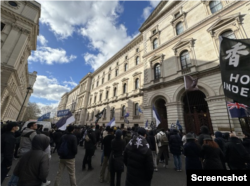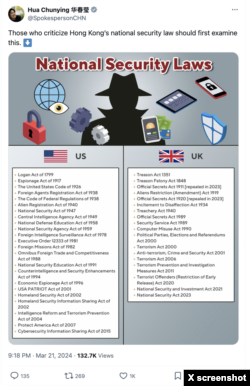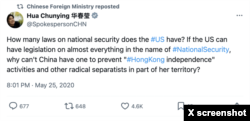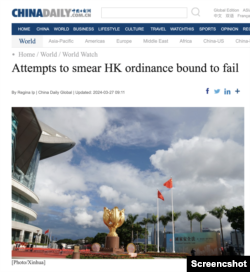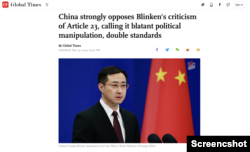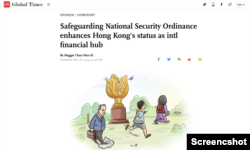Western nations broadly condemned the passage on March 20 of Hong Kong’s Safeguarding National Security Ordinance, or Article 23.
U.S. Secretary of State Antony Blinken said that the “broad national security legislation passed under Article 23 in Hong Kong threatens to further undermine rights and freedoms.”
During a press conference on March 25, the Chinese foreign ministry’s newly appointed spokesperson, Lin Jian, addressed Western criticism by pointing to what he called the “airtight” U.S. national security system:
“The Ordinance strikes a balance between safeguarding national security and ensuring rights, freedoms and economic growth…It does not at all undermine the high degree of autonomy in Hong Kong…The US itself has an airtight national security system, with a large number of laws and unparalleled extraterritoriality. However, it keeps pointing fingers at Hong Kong’s Safeguarding National Security Ordinance. This is sheer political manipulation and hypocritical double standards.”
That is misleading.
Jian’s remarks incorrectly draw a parallel between Article 23 and the U.S. legal system. While the U.S. has national security laws, it does not have a law with as wide a scope.
Careful examination of Hong Kong’s new ordinance reveals that it is starkly different from U.S. principles and in effect undermines Hong Kong’s special status and autonomy.
Hong Kong’s constitutional document, the Basic Law, was established in 1997 and provided a legal basis for the “One Country, Two Systems” policy. It guarantees “fundamental rights and freedoms,” including “equality before the law; freedom of movement…freedom of speech,” as well as a “high degree of autonomy.”
Article 23 undermines freedom of speech and the right to assembly, both of which are fundamental rights protected under the U.S. Constitution and Hong Kong’s Basic Law. It broadens the definition of “sedition” to not requiring incitement of violence for a conviction. That means criticism of the Hong Kong or Chinese government could be defined as “sedition.”
Besides putting protests and whistleblowing in the crosshairs, the new law also enables the Hong Kong government to attack those who have fled and potentially invalidate their passports.
In addition, Article 23 undermines the “One Country, Two Systems” principle constitutionalized in Hong Kong’s Basic Law by importing the legal terms and vague definitions of mainland China’s national security law. For instance, the ordinance uses mainland China’s definition of “state secrets,” which includes information not officially designated as “classified” by the government and related to “any economic, social, technological or scientific developments.”
The law also outlaws any calls for “secession” or independence. In contrast, the U.S. has seen and not suppressed grassroots secessionist movements in California and Texas. As Polygraph.info has reported, China has allowed, if not encouraged discussion of a U.S. civil war despite criminalizing “external influence” in Hong Kong.
The ordinance introduces the concept of “external influence,” which lacked a clear definition or examples of activities with foreign individuals and/or foreign organizations that would violate national security. Instead, like many of the other “crimes” listed, the precise meaning of “external influence” remains vague.
The new ordinance’s dangerously broad scope can also be seen when it comes to Hong Kong’s autonomy and fundamental rights in its implementation. Within a day of Jian’s statement, the law changed the early release process for those imprisoned on national security charges. Because of the new law, an activist known as "Captain America 2.0" was denied an early release on March 26.
It should be recalled that the 2020 national security law led to mass arrests. The Hong Kong Free Press reported in April 2023 that 249 people had been arrested on “suspicion of endangering national security.” The South China Morning Post similarly found in July 2023 that three years after the first round of security laws, there had been over 160 prosecutions on national security grounds.
For its part, Article 23 denies those arrested rights protected both by the U.S. and Hong Kong Basic Law. It allows detainment for 16 days without charges and denial of a lawyer for 48 hours. In contrast, law enforcement in the U.S. can jail an individual for only 72 hours without evidence and must respect a person’s right to an attorney.
It is worth noting that China previously tried to pass a “sedition” law in Hong Kong in 2003 but had to abandon its efforts after mass demonstrations. The 2020 national security law has restricted protest to such an extent that the shelved sedition law is now essentially in effect.
In August 2022, the Chinese foreign ministry wrote on its website that since adopting the 2020 national security law, Hong Kong had “moved from chaos to stability, a change supported and applauded by the Hong Kong residents. Opinion polls show that over 70 percent of Hong Kong residents are satisfied with the implementation of the National Security Law for Hong Kong …”
Yet recent public opinion data polls found 57% of those under 35 in Hong Kong see China’s “power” and “influence” as a major threat.
The Chinese state-sponsored media outlets Global Times and China Daily have echoed the misleading and false claims propagated by China’s foreign ministry spokesperson. They have also tried to dismiss concerns that classifying economic developments as “state secrets” and criminalizing association with “foreign organizations” will harm Hong Kong’s market and status as an international trade hub.






